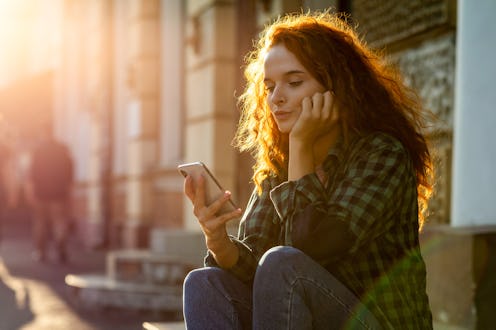Life
7 Ways Social Media Affects Your Wellbeing

Although millions of people use social media every day, all we seem to do is complain about it. On any given day, a scroll through my news feed turns up at least one declaration that someone is quitting Facebook forever, so their true friends will follow them on Instagram. The criticisms lobbed at social platforms are many and varied, but so are the ways social media affects your wellbeing. For all their flaws, online networks have advantages, too, even if they're often glossed over in favor of grousing about smug engagement announcements (which, to be fair, are the worst.)
This isn't to say that social media doesn't have its problems. A recent report from the Royal Society of Public Health (RSPH) and the Young Health Movement examined the influence it has on young people's mental health, and the analysis didn't reflect well on most social networks. Of the five major platforms analyzed, only YouTube was found to have a positive impact on users. According to the report's survey, the other four (Facebook, Instagram, Snapchat, and Twitter) increased respondents' feelings of anxiety. Instagram was the most anxiety-inducing, followed by Snapchat.
Researchers couldn't say for sure why they had the most negative impact, but it's worth noting that both are primarily visual forms of social media. Nothing inspires FOMO like finding someone's vacation selfie from Bora Bora while you're sitting in your bedroom, clad only in your underwear and a light dusting of potato chip crumbles.
But social media isn't all bad. Considering it's probably going to stick around in some form or another for years to come, that's a good thing. Here are seven ways social media influences you — the positives, the negatives, and the in-betweens.
1Making You Feel Connected
According to the Pew Research Center, the vast majority of teens say social media keeps them better informed about their friends' lives and feelings. Furthermore, teens with access to a smartphone are more likely to report feeling better connected to their friends. While it's true that there's no way you're close to all 600 of your Facebook friends, the importance of casual friendships shouldn't be discounted. As Karol Markowicz wrote for the New York Post, "Four friends who will be there for you if you need them at 3 a.m. is a solid number, and there’s nothing wrong with the other... friends playing a different role for you."
2Perpetuating Anxiety
The RPSH study is hardly the only one to associate social media use with feelings of anxiety. Sometimes, it stems from being away from social networking for too long; in 2012, a study found that nearly half of respondents felt uncomfortable when they couldn't access their email or Facebook. Other times, anxiety appears to come from the content of your news feed. Research has shown that social networking sites can impact your self-esteem and even your sleep habits later that night.
3Providing Social Support
Social media may create pressure to have the illusion of a perfect life, but it can also provide a platform for people seeking help. According to research, online sources of social support are increasing in number, possibly because they're easier to maintain across large distances. Despite these social interactions taking place across a screen, there's evidence that online social support still reduces depression and mediates stress, much like the face-to-face kind.
4Increasing Depression (If You're Prone To It)
Social media, and Facebook in particular, has long been associated with depression. In 2015, a study from Denmark's Happiness Research Institute claimed that people who stopped using Facebook for a week were happier at the end of their break than those who used it as normal.
However, saying social media causes depression is something of a simplification. Research has found that how you use social media is tied to how it affects you. Passive use, where you lurk more than you actually post, has been associated with feelings of envy, while more active use appears to be a more pleasant experience. Basically, people who are prone to social comparison are more likely to find social media depressing.
5Influencing Sleep Patterns
Sleep and mental health are closely entwined, so it's no wonder that social media can affect your sleep patterns. In 2016, researchers found an association between heavy social media use and sleep disturbances, and the National Sleep Foundation warns that the ease of accessing social media might cut into the time you spend sleeping. Then there's the fact that blue light — the kind shining from laptops and phones — interferes with your body's sleepytime processes. Scrolling through Instagram before bed probably isn't the best idea.
6Messing With Body Image
Like movies and fashion magazines, social media can heavily influence a viewer's body image. Last year, an extensive review of existing research found a relationship between social networking use, particularly activities like sharing photos, and body image concerns among men and women. This doesn't mean social media is the cause here; it's possible that users already prone to body image issues are more likely to use social media. As TIME points out, though, "the line between a 'like' and feeling ranked becomes blurred" online.
7Providing Chances For Self-Expression
Finally, social media allows users to express themselves however they want to be perceived. In all likelihood, this is at least partly responsible for the illusory "perfect lives" many of us lead on Facebook. On the other hand, online networking provides an opportunity to explore your identity and form connections you may not otherwise develop.
Considering how complicated society is, it's no wonder social media can be difficult to navigate. If you can spend an hour on Instagram every day without feeling inadequate, more power to you. If you find social media exhausting, maybe it's time to take a break. Facebook will still be there if you decide to plug in again.